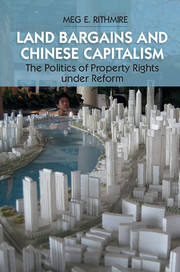Book contents
- Frontmatter
- Dedication
- Contents
- List of tables
- List of figures
- Acknowledgments
- List of Abbreviations
- Glossary
- 1 Property and Politics in China
- 2 The Making of the Real Estate Economy: Urban Reform and the Origins of the Party's Land Dilemma
- 3 The Political Economies of China
- 4 “Land as a State Asset”: Global Capital and Local State Power in Dalian
- 5 Property Rights and Distributive Politics: Urban Conflict and Change in Harbin, 1978 to the Present
- 6 Changchun Motor City: The Politics of Compromise in an Industrial Town
- 7 Conclusions
- Bibliography
- Index
2 - The Making of the Real Estate Economy: Urban Reform and the Origins of the Party's Land Dilemma
Published online by Cambridge University Press: 05 November 2015
- Frontmatter
- Dedication
- Contents
- List of tables
- List of figures
- Acknowledgments
- List of Abbreviations
- Glossary
- 1 Property and Politics in China
- 2 The Making of the Real Estate Economy: Urban Reform and the Origins of the Party's Land Dilemma
- 3 The Political Economies of China
- 4 “Land as a State Asset”: Global Capital and Local State Power in Dalian
- 5 Property Rights and Distributive Politics: Urban Conflict and Change in Harbin, 1978 to the Present
- 6 Changchun Motor City: The Politics of Compromise in an Industrial Town
- 7 Conclusions
- Bibliography
- Index
Summary
If “all politics is local,” then most of Chinese politics is about land. By the mid-2000s, as a result of the dual dependence on land revenue as a key source of finance and on the real estate sector for economic growth, the pursuit of land control and development became the primary activity undertaken by local (city and county) governments in China. The ratio of land leasing and property – or land-related taxes to local government budgetary revenues – grew from 25 percent in 2000 to more than 90 percent in 2010. Real estate investment – funds invested in the development of land and property – grew from 2 percent of GDP in 1992 to 13 percent in 2011.
The extent of China's political and economic dependence on land and real estate was likely surprising even to the land-reform architects who made them possible. Zhao Ziyang, premier from 1980 to 1987 and general secretary of the Chinese Communist Party (CCP) from 1987 until his purge during the Tiananmen protests in 1989, writes in his memoir: “It was perhaps 1985 or 1986 when I talked to Huo Yingdong [a Hong Kong tycoon, better known as Henry Fok] and mentioned that we didn't have funds for urban development. He asked me, ‘If you have land, how can you not have money?' I thought this was a strange comment. Having land was one issue; a lack of funds was another. What did the two have to do with one another?” Zhao goes on to describe how, presumably after he made the connection between landownership and capital accumulation, he presided over the initial experiments to separate ownership and use rights of land, and leasing the latter in return for capita – essentially, commodifying urban land.
This discovery of the “exchange value” of land – its ability to serve as a means of capital accumulation independent of its productive or use value – has resulted in a dramatic reorganization of intergovernmental and political economic relations in China during the last three decades. This chapter narrates the CCP's relationship to land, tracing how land evolved from a national resource to be distributed in the service of socialist production and consumption to a form of capital to an instrument of fiscal and financial policy.
- Type
- Chapter
- Information
- Land Bargains and Chinese CapitalismThe Politics of Property Rights under Reform, pp. 31 - 65Publisher: Cambridge University PressPrint publication year: 2015



